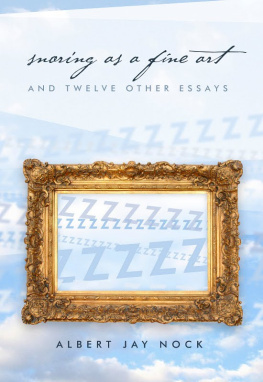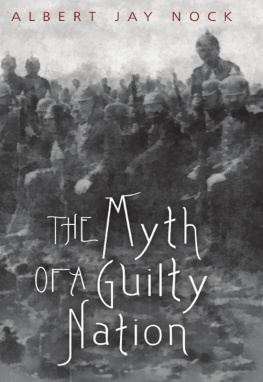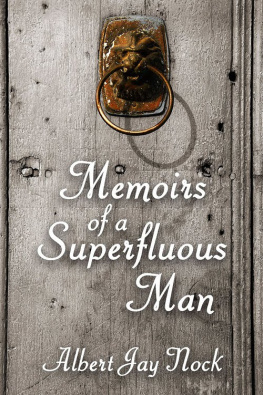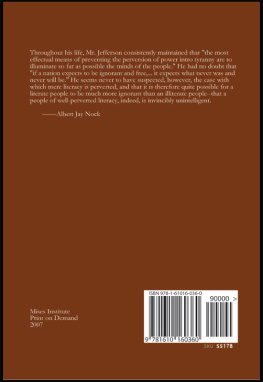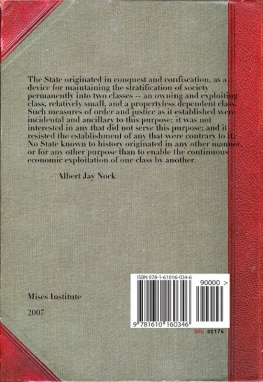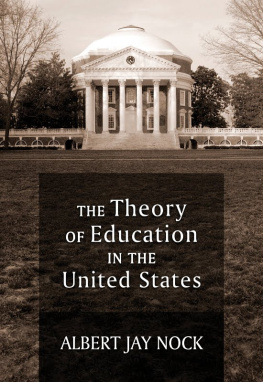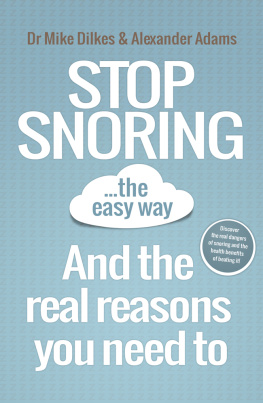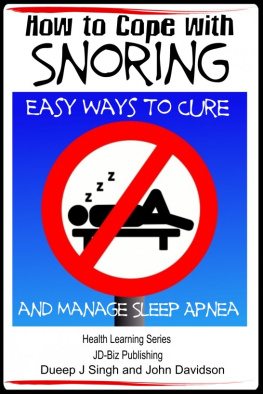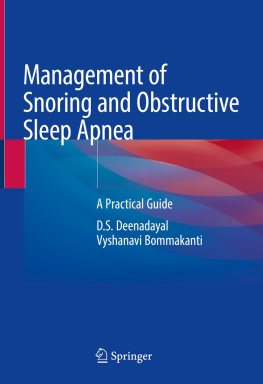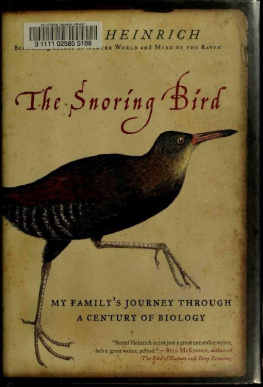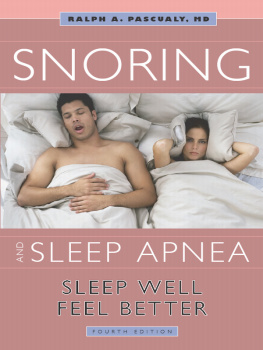SNORING AS A FINE ART
AND
TWELVE OTHER ESSAYS
By
Albert Jay Nock

RICHARD R. SMITH PUBLISHER, INC.
Rindge, New Hampshire
1958

Copyright, 1958 By
Francis Jay Nock
Published By
Richard R. Smith Publisher, Inc.
Topside, West Rindge, N. H.
Library of Congress
Catalog Card Number:
57-10363
All rights reserved. No part
of this book may be reproduced
in any form without
permission of the
publisher.
Printed in U. S. A. by
The Colonial Press Inc.
These Essays were selected
in memory of
Albert Jay Nock
by his friends
of many years
Ruth Robinson
Ellen Winsor
Rebecca Winsor Evans
ACKNOWLEDGMENTS
Permission to reprint the essays herein has been graciously granted by the original copyright owners specified below. Since publication, however, the ownership of the several copyrights has been transferred to the authors son, Dr. Francis Jay Nock.
The American Mercury:
What the American Votes For. February 1933
The Atlantic Monthly:
If OnlyAugust 1937
Sunday in Brussels. September 1938
Snoring As a Fine Art. November 1938
The Purpose of Biography. March 1940
Epsteans Law. October 1940
Utopia in Pennsylvania: The Amish. April 1941
The Bookman:
Bret Harte as a Parodist. May 1929
Harpers Magazine:
Alas! Poor Yorick! June 1929
The Kings Jester: Modern Style. March 1928
Scribners Magazine:
Henry George: Unorthodox American. November 1933
Life, Liberty, AndMarch 1935
The Sewanee Review.
Advertising and Liberal Literature. Winter 1918
CONTENTS
1. Introduction
By Suzanne La Follette
2. Snoring As A Fine Art
And the Claims of General M. I. Kutusov As an Artist
8. Bret Harte As A Parodist
With a Note on Nationalism in Literature
11. Alas, Poor Yorick!
An Apology for the Human Race
INTRODUCTION
By Suzanne La Follette
A FRIEND who saw a great deal of Albert Jay Nock during his long sojourns in Belgium once said to me, I dont know how he does it; but when youre with Albert Nock you find yourself coming out with things you didnt know you had it in you to say.
This effect of certain rich personalities on those privileged to associate with them is not easy to explain; more especially since not all rich personalities produce it. Perhaps it is brought about by a spiritual courtesy; a tolerant expectancy; possibly, more than anything else, by a willingness to help the truth along without encumbering it with themselves, to use an expression which Albert Nock was fond of quoting. Nock, for example, was temperamentally incapable of taking you down, when you mentioned a good idea that had just come to you, with, Of course. That is exactly what I said in my last article. (In all the years I knew him, I never once heard him quote himself.) He tacitly granted your right to independent discovery and discussed your offering on its merits.
But why speculate on a quality so elusive as the gift of stimulating people to be better than they are? It is wiser merely to bear witness; as Edward Epstean did (that racy character and friend of the Freeman staff to whom Epsteans Law is playfully ascribed in these essays). When the Freeman was about to cease publication after four wonderful and financially unprofitable years, he remarked to Albert Nock:
Youve done a great deal for all those young people.
I dont know that Ive ever done anything for them except let them alone, said Nock.
Yes, I understand, answered Epstean. But if someone else had been letting them alone, it would have been a very different story.
Yet I dont think Albert Nock was primarily interested in people. He was much too fastidious; a true intellectual aristocrat. Indeed, there were even some who thought him an intellectual snob, and little did he care, for he was indifferent to gossip about himself and never gossiped about others. People qua people rather appalled him, and the ascendancy of mass man in modern society and the councils of government filled him with the horror that emerges from these essays. There frequently crept into his work after Freeman days more than a touch of his disdain for the cheapness and vulgarity of the life that followed World War One. I remember once suggestingit was in the late twentiesthat it was likely to antagonize those whom otherwise he might persuade. He said he thought I was probably right, but I think my lament left him essentially indifferent.
He was interested in ideas (The idea, he once wrote, is forever the fact). He was interested in intelligent and civilized people. And he was above all interested in ability. The nearest he ever came to boasting was in his claim to instinctive recognition of ability. Character, he would say, eluded him; he could not judge it; but on ability no one could fool him.
He was not only interested in ability; he sought it out and encouraged it. He gave it a chance to develop by letting it alone in his own very special way. Not as a conscious service to society or his country or even to the beneficiary. It was, I suppose, the teachers instinct in him; the instinct to serve truth. But he never tried to impose his truth on his pupil. Rather, he was concerned to put the pupil in the way to find truth for himselfas if he had revised the Biblical saying, Ye shall know the truth, and the truth shall make you free, to read, Ye shall be free in order that ye may know the truth. Nor was he looking for gratitude. You dont try to repay the help that is given you, he would say. You pass it along to others.
He passed along to those young people freedom to develop in their own way, to find their own truth. He himself had a gift for grasping the importance of truths so obvious that almost everyone overlooks them. One of thesethe one that more than anything else made him a great editorwas that any organization is people, and that no organization can be better or other than the people who compose it. His interest as an editor was in the people who produced the magazine. I remember an impromptu talk he made to the staff one day at lunch, after the Freeman had been publishing six months. He had not worried about the quality of the magazine, he told us, for if the people engaged in an enterprise were happy and growing in their work, the enterprise was bound to reflect their spiritual state. He felt that the people connected with the Freeman were happy in their work, and growing in it; and so long as that was true the magazine could not be other than excellent.
The reader of this little book will find expressed in it again and again this awareness that organizations are people. As the Freemans guiding spirit he put it to good service. He brought together a group of people whom he considered able, and ensured the health of the organization by the simple method of letting them alone.
I have dwelt at this length upon Albert Nocks relations with those young people of the Freeman because it seems to me that his editorship of that magazine which he made so remarkable is an index to the character and influence of a very remarkable man; a man who was a libertarian not only in theory but in practice, and whomirabile dictuwanted liberty for others as much as for himself; who clearly realized, indeed, that without liberty man is a slave no matter how many subsidies and services officious overlords may impose upon him.
Next page
